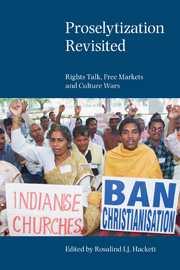Book contents
- Frontmatter
- Contents
- Preface and acknowledgements
- Contributors
- Revisiting Proselytization in the Context of Rights Talk, Free Markets and Culture Wars
- Section I
- Conflicts over Proselytism - An Overview and Comparative Perspective
- Conversion of the World: Proselytization in India and the Universalization of Christianity
- The Logic of Anti-proselytization, Revisited
- Section II
- Section III
- Section IV
- Section V
- Index
Conversion of the World: Proselytization in India and the Universalization of Christianity
from Section I
- Frontmatter
- Contents
- Preface and acknowledgements
- Contributors
- Revisiting Proselytization in the Context of Rights Talk, Free Markets and Culture Wars
- Section I
- Conflicts over Proselytism - An Overview and Comparative Perspective
- Conversion of the World: Proselytization in India and the Universalization of Christianity
- The Logic of Anti-proselytization, Revisited
- Section II
- Section III
- Section IV
- Section V
- Index
Summary
Religious conversion and proselytization are taken to be general problems of plural societies today. The basic structure of these problems seems so self-evident that it is rarely stated explicitly: the encounter between different religions gives rise to competition regarding the gain and loss of adherents. Some of the followers of one religion reject its teachings and accept those of another. This competition in its turn generates tension, conflict and violence between the religious groups in question. Such is the tacit consensus on the nature of the predicament. The common solution is as clear: the principle of freedom of religion should be respected in all societies. Each citizen has the right to choose freely between religions and a liberal neutral state ought to safeguard this freedom.
We will argue the consensus is mistaken. First, it is impossible to speak of one problem and process of religious conversion as though it were shared by various religions and societies. One does not possess any theoretical criteria today to distinguish religious conversion from other processes of change. Therefore, one is unable to identify this process and the related problems across different societies. Second, we will argue that religious conversion is commonly held to be omnipresent, because of three underlying assumptions. These assumptions view the cultural diversity of humanity as a religious rivalry and religions as belief systems to which truth predicates apply. Third, we will take the Indian case to show that religious conversion is a predicament that exists predominantly in Christianity and Islam.
- Type
- Chapter
- Information
- Proselytization RevisitedRights Talk, Free Markets and Culture Wars, pp. 53 - 76Publisher: Acumen PublishingPrint publication year: 2008



